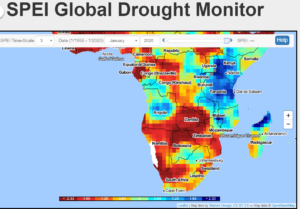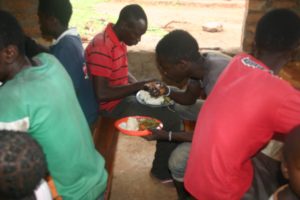
In just a few short months it has enveloped the earth and has brought the nations of the world to a screeching halt. Within this window of time there is no precedent for this rapidly spreading event. What does the Bible tell us to do in the face of this pestilence? Is this Coronavirus or Covid-19 virus connected to Bible prophecy?
“…Go, my people, enter your rooms and shut the doors behind you; hide yourselves for a little while until his wrath has passed by….” (Isaiah 26:20)
In most modern translations it is either “perilous” or “deadly” but in the King James Version, it is known as a “noisome pestilence” found in Psalm 91. In the Hebrew “noisome” is havvah (Strongs H#1942) which translates as “eagerly coveting or rushing upon, ruin, calamity, perverse, very wickedness.” More aptly put in modern English, it is a “rapidly engulfing and deadly pestilence” which describes the Coronavirus virus quite accurately. “Pestilence” is deber (Strongs H#1698) meaning “destroying pestilence or plague.”
The common reference point used is the Spanish flu outbreak of 1918. In actuality, it was a two-year pandemic aided greatly by World War I field hospitals and poor treatment practices conducted around the world as it spread. As of this writing I believe only four nations have not reported Coronavirus cases within the span of three months, a pandemic lethality that cannot yet be numbered. But truly it is rapid and engulfing.
There is much fear and panic in the world today surrounding the Coronavirus. Many are consumed by this event, fear is at the door and their faith is being tested. Where do you stand in facing this advancing pestilence? To be sure, we know that almighty God is sovereign and in control of all things, He knows “the end from the beginning” (Isaiah 46:10) and that He holds each of His children in His hands and nothing happens to them without His allowing it. Thus, the real question becomes “where are we in our faith?”
In that regard, the entirety of Psalm 91 is filled with the goodness and power of God. It reminds us that He faithfully works on behalf of those who love Him. Three times it names pestilences or plagues. You might be encouraged to pray this psalm over you and your family and others, but not as ‘magical words’ or an ‘enchantment.’ But if you choose to pray it, pray it out loud that it is heard in the spiritual realm as well. In fact, I encourage you to speak the word of God publicly every day at home and elsewhere.
“He who dwells in the secret place of the Most High
Shall abide under the shadow of the Almighty.
2 I will say of the Lord, “He is my refuge and my fortress;
My God, in Him I will trust.”
First, it says he who dwells in the shelter of the Most High. When it’s storming outside many seek shelter in a safe building or structure. As Christians now facing a virus storm, do we seek the shelter, comfort and protection of our Lord, or do we look elsewhere? Is He truly our mighty fortress?
3 Surely He shall deliver you from the snare of the fowler
And from the perilous (“noisome”) pestilence.
4 He shall cover you with His feathers,
And under His wings you shall take refuge;
His truth shall be your shield and buckler.
5 You shall not be afraid of the terror by night,
Nor of the arrow that flies by day,
6 Nor of the pestilence that walks in darkness,
Nor of the destruction that lays waste at noonday.
9 Because you have made the Lord, who is my refuge,
Even the Most High, your dwelling place,
10 No evil shall befall you,
Nor shall any plague come near your dwelling;” (Psalm 91: 1-6; 9-10 emphasis added)
But, do we really mean it if we proclaim it? Are we just speaking words, or do we believe it in our hearts? Do we truly rest in Him to be a mighty and strong fortress that we can run into and find peace and protection? In turning our lives over to Him we must surrender it all in humility and trust, and do not fear! He is in absolute control no matter what happens.
Almighty God is with those who make Him their refuge and strength. We must live a life of holiness in the Lord Jesus Christ and trust in Him with all our heart, mind and soul. He will be with us every step of the way no matter what mountain we face, or whatever outcome we have in His perfect will for us. He has promised never to leave us or forsake us!
God promises to be with us in everything, in every storm, every turmoil, every circumstance, if we will but trust Him in all things. He is in absolute control no matter what happens, and nothing will happen to you unless He allows it. As Peter Marshall put it, “God will not permit any troubles to come upon us, unless He has a specific plan by which great blessing can come out of the difficulty.”
Think on this just for a moment:
6 “Are not five sparrows sold for two copper coins? And not one of them is forgotten before God. 7 But the very hairs of your head are all numbered. Do not fear therefore; you are of more value than many sparrows.” (Luke 12:6-7)
It says that He numbers even the hairs on our head. That’s how much He loves and cares for those that are His.
“The angel of the Lord encamps all around those who fear Him, And delivers them.” (Psalm 34:7)
Be still and know that He is God and there is no other. He loves us and says the angel of the Lord will encamp around those who fear Him and He will deliver them. Is that you?
Is there a reason for this viral pandemic?
God has allowed this virus to speed through the earth like no other and the world has now changed. With its sudden impact on the global economy, the virus has most likely already maneuvered the world into a recession to be verified in future economic reports. This virus did not take the Lord by surprise and our confidence is knowing that He holds the future in His hands, thus the future of our individual lives as well.
Some ask if this is connected to Bible prophecy?
The world is on lock-down. The full impact hasn’t hit the US just yet, but the daily headlines clearly tells us the reality of the pandemic as it sinks in. It’s not a very deadly virus (i.e. ebola)–although all of us know people in the most vulnerable demographic, and we are concerned for their well being. But the uncertainty surrounding the virus, and the breakneck speed with which it spreads, has sent people’s emotions, sense of security, and the stock market into a tailspin. The global shock wave is like no other. So sudden, we have not been able to put it in proper context.
Many of us are familiar with 2nd Chronicles 7:14. I had an interesting conversation a couple of days ago with my good friend and former pastor who reminded me of what preceded. He asked, “do you recall verse 13?
“13 When I shut up heaven and there is no rain, or command the locusts to devour the land, or send pestilence among My people…”
Given the context of our discussion, his salient point made is startling to consider, it is the template he referenced. A drought has impacted many nations this past year, one cannot help but recall images of the Australian continent on fire for almost six months. Then, a couple of months ago, several articles around the globe spoke of “10 plagues” that were all impacting different nations of the world. Emphasized were the locust invasions, greater than any have seen in over a century, that swept through Africa, the Middle East and as far east as China, Pakistan and India, consuming at times whole fields inside of 30 seconds. Last week the Times of Israel reported that breeding of the locusts was creating a massive second wave moving towards the same nations. And then, with little warning, the Coronavirus exploded on the world in the first 90 days of 2020.
“And there will be famines, pestilences, and earthquakes in various places. All these are the beginning of sorrows (labor pains). (Matthew 24:7-8 emphasis added) In His Olivet Discourse, Jesus told the disciples that troubles throughout the world would increase in intensity before His return much like labor pains on a woman giving birth.
I believe what we are witnessing with Coronavirus is very definitely evidence of the increasing birth pains that Jesus described, all the more with the earthquakes, locust plagues, droughts, Australian wildfires and the lawless spirit that is being witnessed throughout the world. In fact, this virus is a strong labor pain.
But, the Bible does seem to assure that the world will recover from this pandemic based on what Jesus spoke, “But as the days of Noah were, so also will the coming of the Son of Man be. For as in the days before the flood, they were eating and drinking, marrying and giving in marriage, until the day that Noah entered the ark.” (Matthew 24:37-38) Right now this is not happening. But these verses seem to infer that at His return, life on earth will be normal if not prosperous, that eating, drinking and weddings will continue as they always have. Thus, a recovery from this unprecedented event almost surely will follow. But, to further the point, Jesus later said that the “Son of Man will return at a time you think not.” (Luke 12:40)
It is the strongest labor pain thus far and it has been felt by the entire world. As the nations have been forced to suddenly shut down in a hushed panic ….do you not hear Him saying to the populations of the earth, “Do you know what time it is?”
We will never know the day or the hour nor should we attempt to predict it. But, it is the season of His promised return.
“May we not ignore the signs that are right before our eyes. May we not be slow of heart to believe!”- Amir Tsarfati
Awaken Church.



